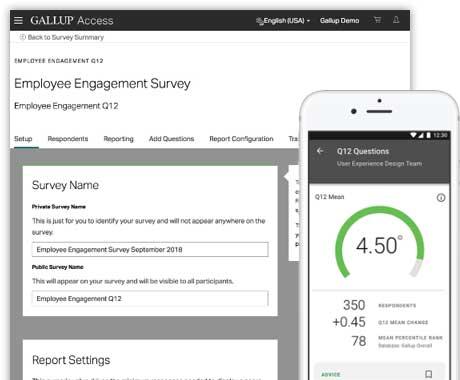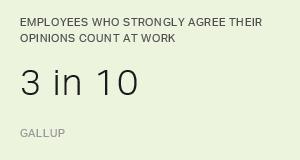Story Highlights
- Rather than receiving more messages, employees want to be heard
- High performers understand your business and customers best
- Taking action based on employee input positively impacts culture
A big part of culture change and change management in an organization comes down to communication. However, according to Gallup's recent State of the American Workplace report, only 13% of U.S. workers strongly agree that their organization's leadership communicates effectively.
But what you think of when you hear "communication" may be part of the problem. Often, when we tell executives that their employees want better communication, the actions they take in response tend to include more presentations, more emails, more internal memos, more town halls, more messaging.
Good leaders listen before they act. And the best leaders prioritize listening to their best people.
In fact, in many cases what employees are actually saying is that they want to be heard. Only three in 10 U.S. employees strongly agree that at work their opinions seem to count. And organizational change, in particular, is one area where employees are especially likely to feel left out of the discussion.
Naturally, leaders believe it is their responsibility to lead culture change within their organization. But they often forget that good leaders listen before they act. And the best leaders prioritize listening to their best people.
Why You Should Listen to Your Stars
There's a good reason leaders flinch when it comes to receiving feedback. They've been burned in the past.
They open up for questions during a meeting, and the most disengaged employees hijack the discussion. The loudest voices are not always the most important voices, but unfortunately, they can drive the conversation.
For this reason, leaders need to be selective and give special attention to those employees who are:
- high performers
- highly engaged
- have extensive experience in the organization
These employees are the most likely to understand your business, understand your customers, understand the limitations of what can and can't be changed, and believe strongly in your mission.
Leaders should evaluate surveys and focus groups with particular attention to their best people. Remember that they get you better than anyone, and they want to see your organization succeed.
When you allow your employees to dream with you, you don't have to work on getting buy-in. They already believe in it because they helped create it.
Consider bringing together your top performers for a conversation -- maybe a quick breakfast discussion or an all-day retreat, both are valuable listening opportunities. Take time to think through the questions you want to ask them and be prepared to probe them not only on their responses, but on their thoughts behind each response.
For example, you can ask them about how your culture connects to your growth strategy: Does that sound right to you? What are we missing? What would brilliant success look like?
When you allow your employees to dream with you, you don't have to work on getting buy-in. They already believe in it because they helped create it.
Ultimately, you want to create a workplace that attracts more people like your best people -- so why not get their input in the process? Make a workplace that they love, and you'll naturally attract others like them.
Don't Forget to Take Action
There is one important caveat to this topic: If you want people to feel like their opinions matter, you must always acknowledge and, whenever possible, show you have taken action based on their input.
Ultimately, you want to create a workplace that attracts more people like your best people -- so why not get their input in the process? Make a workplace that they love, and you'll naturally attract others like them.
Gallup has found that when leaders send out an employee survey but take no action on the results, it can lead to lower engagement than doing no survey at all. This is why we recommend the creation of an action team prior to fielding a survey, who is tasked with responding to the results.
Conversations with employees work much the same way. Ask for their opinions, and then make their opinions count. The result is not only a more engaged employee, it's a better organization where talented people want to work, grow and win.
Gallup can help you collect feedback -- and then act on it to achieve the culture change you want:
- Gather input from your top-performing employees with the all-in-one workplace platform, Gallup Access.
- Download our free perspective paper to learn more ways to enact culture change.
- Partner with us to create a culture that inspires better engagement and top performance



